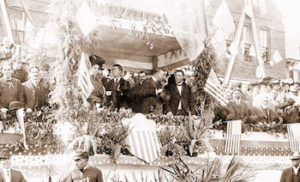
Booker T. Washington
The Atlanta Compromise occurred on this date in 1895. In a speech at the Atlanta Exposition, Booker T. Washington, a leading Black educator in the U.S. in the late 19th century, made this landmark statement on race relations.
This was a public address from him, then a black national leader of activism in post-reconstruction America.
In a time of severe racial conflicts, Washington asserted that vocational education, which gave blacks an opportunity for economic security, was more valuable to them than social advantages or political office. In one sentence during his speech, he summarized his concept of race relations appropriate for the times; “In all things that are purely social, we can be as separate as the fingers, yet one as the hand in all things essential to mutual progress.”
White leaders in both the North and South greeted Washington's speech enthusiastically, but it disturbed black intellectuals who feared that Washington's philosophy would doom Blacks to indefinite subservience to whites. That apprehension led to the Niagara Movement and later to the founding of the National Association for the Advancement of Colored People (NAACP).